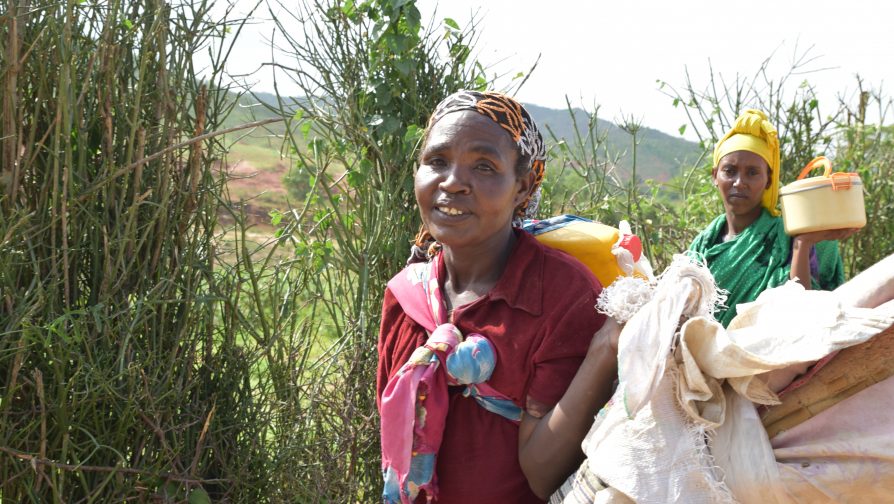“I was really scared, so I decided to cross the border with my family to Kenya for safety”
Balanish Tadese, an Ethiopian mother of two, walks through a makeshift refugee camp in Moyale, Kenya, with a bundle of personal belongings strapped to her back. Her 6-year-old son, Abdi, and 9 year old daughter, Sarah, follow close behind, clutching personal belongings in their hands. They’re looking for something to eat or drink, and somewhere to stay.

Balanish Tadese, one of the 10,000 Ethiopians who has sought asylum in Moyale Kenya. UNHCR/ Rose Ogola
This family is among around 9,700 asylum seekers that arrived in Moyale over the last few days from the Oromia region of Ethiopia. The refugees allege 13 people were killed when Ethiopian soldiers attacked their villages, in a raid on opposition areas. Oromia has been the scene of protests and violence before.
Tadese explains what she saw.
“One of my neighbours was shot and killed during the day as he came from a school meeting in our village. The following day, another neighbour was strangled as he went to the shops in the evening. I was really scared, so I decided to cross the border to Kenya for safety”
The Government of Ethiopia says that soldiers mistakenly killed 9 civilians, and wounded a dozen others. The soldiers involved have all been disarmed. The Government has also sent a high level delegation to the region to investigate the killings.
There are over 600 expectant mothers.
More than 80 per cent of those that have fled to Kenya are women and children; nearly 1500 are under age 5, with one child being just 6 days old. There are over 600 expectant mothers. Some disabled and elderly persons also fled.
Tadese says her and her children have not eaten well for days.
The asylum seekers are staying in two makeshift camps in the Somare and Sololo areas of Moyale. They are in urgent need of food, water, sanitation facilities, shelter, and some have medical needs. Tadese says her and her children have not eaten well for days. She’s worried that her children will become ill if they do not get help.
An asylum seeker cooks for her family outside her makeshift shelter. UNHCR/ Rose Ogola
UNHCR, the UN Refugee Agency is on the ground in Moyale co-ordinating the emergency response. UNHCR’s partner, the Kenya Red Cross along with the County government in the area has been providing emergency assistance, such as food and water, shelter materials, blankets, kitchen utensils as well as medicine and sanitation, since the influx began. Other organisations like UNICEF, World Vision and Concern are also helping.
The Kenyan Government is looking at reducing the number of makeshift camps, so UNHCR, the UN Refugee Agency in Kenya, the Kenya Red Cross, and others can meet the needs of those that have arrived more effectively. UNHCR is also helping the Government of Kenya register the asylum seekers, while ongoing assessments are being made about what to do long term.
But right now it’s not clear how long the asylum seekers might stay in Moyale.
One of the challenges is that some of the asylum seekers are staying with relatives and friends in Moyale, so it’s difficult to know precisely how many more have fled and are affected, and what their needs might be.
Tadese and others who fled with her say they are worried about the security situation back home, and fear being situated in camps close to the border with Ethiopia. The Ethiopian government says it is trying to stabilize the situation, so people can go back home.
But right now it’s not clear how long the asylum seekers might stay in Moyale.
Share on Facebook Share on Twitter